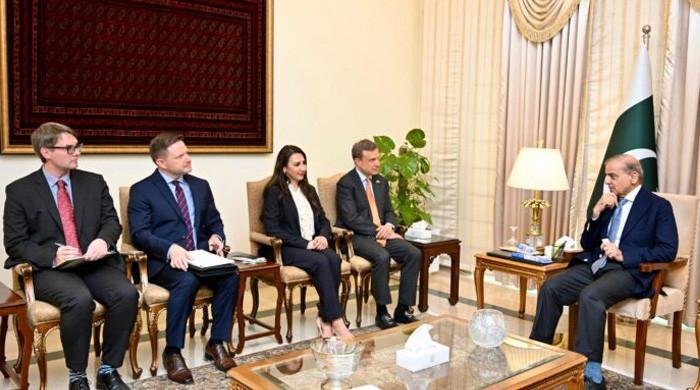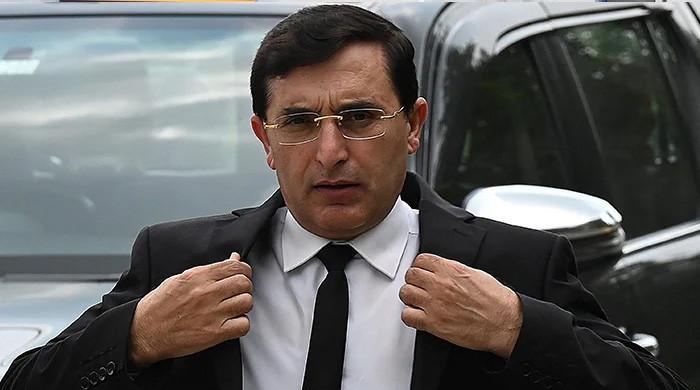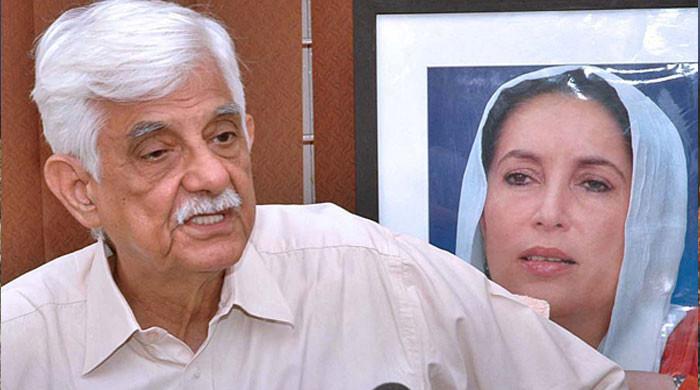Did PM Imran Khan really say rape is linked to how women dress?
A heated debate on social media has many accusing PM Imran Khan of linking how women dress to a surge in rape cases in Pakistan
April 09, 2021
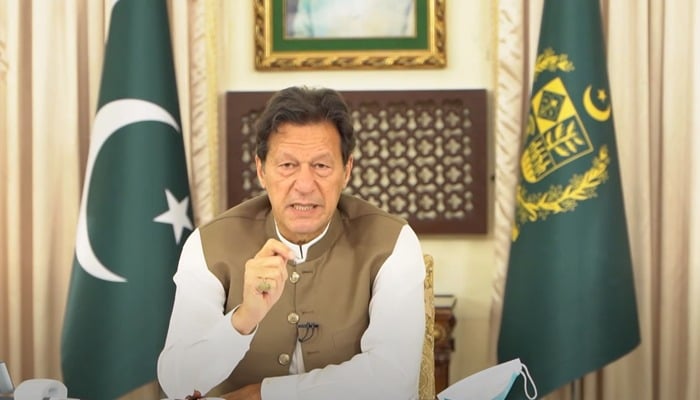
Prime Minister Imran Khan has been facing severe criticism for the past couple of days, with many people accusing him of victim-blaming women who have experienced rape and sexual violence.
What happened?
The controversy arose from a public question and answer session hosted by the prime minister on Sunday, April 3.
The prime minister took calls from the general public and answered their questions on important matters. These included corruption, unemployment, inflation, the coronavirus and Pakistan’s economic conditions.
During the session, Arshad Khan from Latifabad, Hyderabad, called the prime minister to ask him what “you and your team” have done about the rising incidence of sexual violence and rape, especially targeting minors.
The caller asked PM Imran Khan if he was satisfied with the steps his government had taken to curb incidences of sexual violence and why no culprit had been hanged publicly for the offence yet.
“Because perpetrators of these crimes do not deserve any sort of relaxation,” concluded the caller.
In response, PM Imran Khan said: “Arshad, you’ve talked about an issue which gives me a lot of pain.”
“[Sexual] crimes against children and [the crime of] rape against women reported in newspapers — they are very, I mean — [they] are not even 1% of what happens,” he said, alluding to the fact that very few of these violent crimes are actually being reported.
“This [the incidence of sexual violence] has rapidly spread in society. It was always present, but previously people did not talk about it [openly] due to shame. Now, more people are having a conversation about it,” he said.
“Hence we should not be mistaken [about the number of cases] — a lot of such cases happen, [of] sexual violence against children and rape," he said, remarking on the severity of the malaise.
'Rape cannot be tackled through legislation alone'
"I want to say one thing about this: just like corruption, you cannot eliminate this simply by making laws.
“We have introduced very strict laws. The rape ordinance that our government has introduced contains very harsh penalties against those who sexually assault children and commit rape. It [the ordinance] is very stern, but it alone will not be enough to fight [sexual violence]. Society as a whole will have to [play a part],” he stressed.
The prime minister said many battles are fought by society together, adding that a government can introduce laws but if people don’t obey them, they will not serve any purpose.
“How many people can you arrest?” he asked.
“It is society which has to decide that this is [a cause of our] destruction,” he said.
Rape tied to 'fahaashi' — vulgarity
The prime minister then addressed the reasons which, according to him, were behind the rising cases of rape and sexual violence in Pakistan.
“If you keep on increasing ‘fahaashi’ (vulgarity) in any society, it will ultimately have an [adverse] effect,” he said.
“Why does our religion forbid [vulgarity] — the whole concept of pardah, why is it there? So that there is no temptation in society,” he added.
This comment, in particular, was widely interpreted as the prime minister tying rape to how women dress — whereas the term 'pardah' is understood in Islam to refer to both men and women guarding their modesty.
'Higher rapes due to proliferation of pornography'
“Not every person has the strength or willpower," the prime minister continued. "If you keep on increasing fahaashi in society and not take precautions against it, it will have effects."
The prime minister went on to recall his own life experiences in the UK, saying that English society when he first went there was quite different from what it has become now.
“[The lifestyle of] sex, drugs and rock n roll was just starting out. Gradually, we saw that fahaashi increased there — at first there used to be adults-only films, and the content of those adults-only films later started spreading everywhere and got space on the [mainstream] media as well,” he said.
“As a result, it had a direct impact on their family system,” he continued. “When I went there, one couple in 17 used to get divorced. Today, the divorce rate [in the UK] has reached 70% and it is on the rise,” the premier stated.
He also complained that ever since Bollywood started “adopting” Hollywood, "the same situation is developing in India as well".
“Delhi is known as the rape capital,” he said.
The prime minister said there are a lot of decisions that society, as a whole, has to ponder upon.
“There are a lot of things that we [the government] cannot control, such as films [produced in] other countries — Bollywood or Hollywood movies that you see on the TV,” he said.
He recalled how Bollywood films had "drastically changed" from what they were in those days to “what they have become now”.
“It is bound to have an effect,” he said. “What our religion tells us — this concept of pardah — it had some philosophy behind it,” added PM Imran Khan.
He explained that the philosophy behind pardah is “to save the family system and protect society from these things”.
Turning his attention to what he saw was a related issue, the premier said mobile phones were causing "the biggest damage" in society.
“Children now have access to material these days that they never had before in human history,” he said. “Hence we need a holistic approach [to tackle this problem].”
“What I am trying to say is that we [the government] will make laws against this [sexual violence], but we all have to [collectively] fight it. It is a cancer spreading among our society on a very large scale and is being reported on a very small level. We all have to battle against it,” he concluded.
Controversy on social media following PM Imran's comments
Following the prime minister's remarks, his video clip addressing rising incidences of rape went viral on social media, with many saying the prime minister had blamed women and the way they dress for inciting rapes.
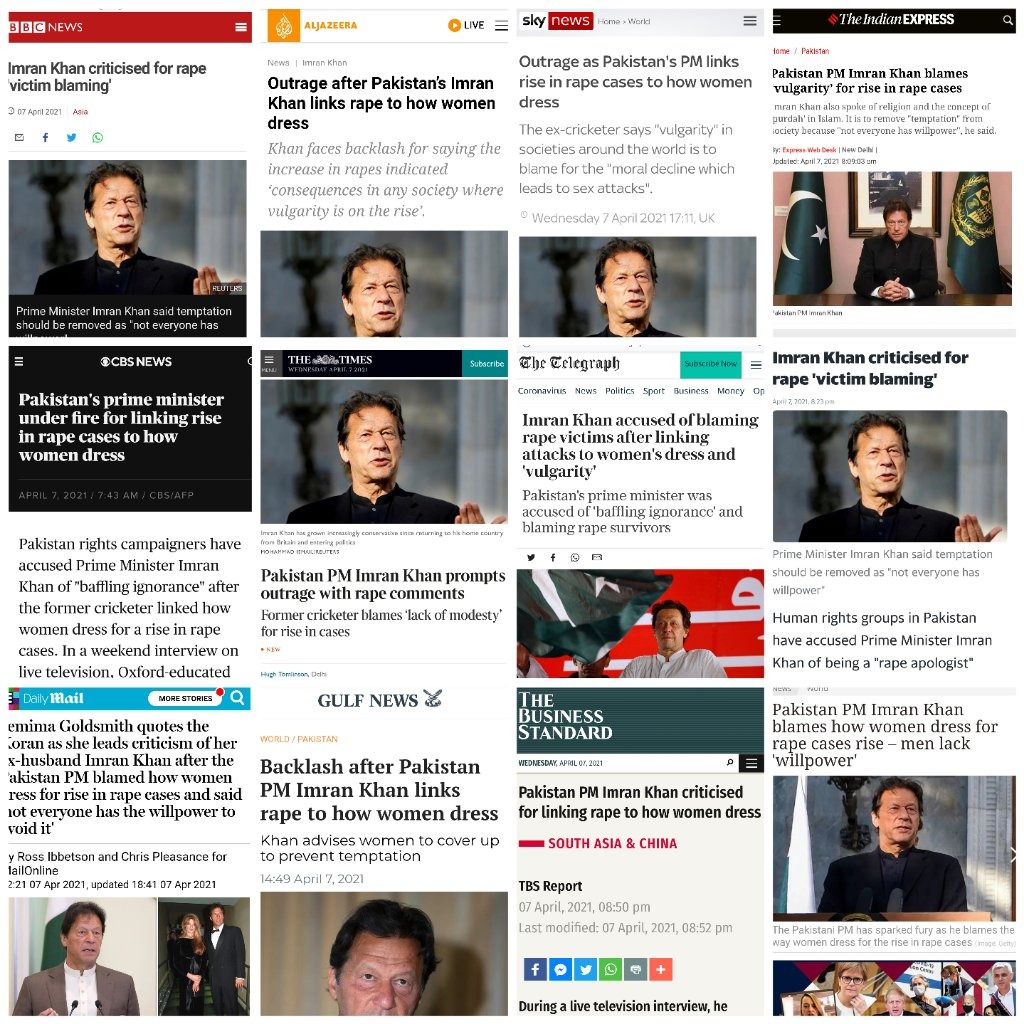
A number of international news outlets, such as BBC News, Al-Jazeera, CBS News, The Indian Express, Sky News and The Daily Mail and others took headlines that suggested that the premier had linked a rise in rape cases across Pakistan to how women dress.
"Pakistan’s Prime Minister Links Rape to ‘Vulgarity’ and How Women Dress," read the headline of the New York Times (NYT).
"Outrage after Pakistan PM Imran Khan links rise in rape cases with how women dress," said Indian news website Scroll's headline.
"Imran Khan criticised for rape 'victim blaming'," read BBC News's headline.
"Outrage after Pakistan’s Imran Khan links rape to how women dress," stated Al-Jazeera's headline.
Did Prime Minister Imran Khan state that 'rape happens because of the way women dress'?
Technically, no he did not. Prime Minister Imran Khan did not say that rapes occur because women dress in a particular way.
However, he did explicitly tie the increasing incidence of rape and sexual violence to fahaashi (which he believes creates the temptation to commit crime), and he did hold up the idea of pardah as a means to eliminate temptation.
In themselves, both fahaashi (which translates roughly to vulgarity or moral depravity) and pardah (which translates to veiling or protecting oneself) are not concepts that, in their classical sense, apply to a particular gender per se. They are catch-all terms that can refer to a broad range of concepts depending on varying social and cultural perspectives.
For example, it is widely understood that the concept of 'guarding one's modesty' (observing pardah) in the Islamic worldview — which the prime minister seemed to be alluding to when he spoke with reference to "our religion" — is equally applicable on both men and women.
Secondly, the prime minister's subsequent exposition on fahaashi during the conversation seems to indicate that he was referring more broadly to moral decline (he specifically referenced the era of 'sex, drugs and rock and roll' and wider availability of pornography in the digital age, for example, rather than women dressing in a particular way).
It seems, therefore, that the controversy arose in the translation of these nuanced concepts from one language to another, especially when he was quoted as saying that "rapes occur because of the way women dress" — a phrase which is highly loaded with negative meaning amidst a global reawakening on women's rights.
'The Imran I know'
The prime minister's ex-wife, Jemima Goldsmith — British screenwriter, television, film and documentary producer — had reacted strongly to reports of her former husband's remarks on the rape controversy.
She quoted a Daily Mail article on the matter in her reaction tweet.
She said she hoped the comments by the prime minister were mistranslated, disclosing that this did not sound like "the Imran I know".
According to Goldsmith, when she was married to the cricketer-turned-politician, he would say: "Put a veil on the man's eyes, not on the woman".
Where does PM Imran Khan stand on women's rights?
Goldsmith's latter comment prompted us to revisit the prime minister's positions on women's rights in the past.
From the record, it seems the prime minister has spoken strongly in favour of women's right to inheritance and education, as well as the need to empower them on several instances in the past.
On November 22, 2014, he had said during a PTI rally: "We will back our women until they don't get their rights and their biggest right is to seek education".
On September 1, 2014, he said: "PTI is the first party in Pakistan's history that introduced women to Pakistani politics. We stood for their rights and empowered them. This is the first party in Pakistan to do so."
On November 25, 2014, he said: "In both Shariah and the Constitution, it is their [women's] right to inherit property. They are not given that right in rural areas and even in cities."
"We have to instill the passion so that our women can stand up for their rights. You will stand up for your rights now — you will not ask for them, you will take them by force," he had said.
On September 9, during a public rally, he had said: "We are fighting for the women who are not provided their due rights. The women who are oppressed and can not raise their voices against it."
Even during the conversation in question, the prime minister took great pains to communicate that sexual violence is a much more serious and prevalent issue than is commonly understood, and that it is an issue that he feels strongly about.
Could the prime minister, therefore, have just handled the question poorly, or is his understanding of the issue actually informed by some problematic opinions?
That is a moot point — but it's clear that his answer has left a lot to be desired and ended up sending some very wrong signals across.
So far, the prime minister has not commented on the controversy triggered due to his remarks.




